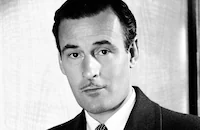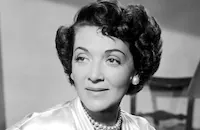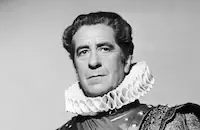Criminal Court

Brief Synopsis
Cast & Crew
Robert Wise
Tom Conway
Martha O'driscoll
June Clayworth
Robert Armstrong
Addison Richards
Film Details
Technical Specs

Synopsis
Criminal attorney Steve Barnes has made a name for himself with his clever courtroom tactics and dedication to justice. After Steve, who is running for district attorney on a "clean government" platform, exposes Bob J. "Brownie" Brown, a phony eyewitness in a gangland murder case, as a perjurer, he is contacted by Brownie's boss, gangster and nightclub owner Vic Wright. Wright, with whom Steve's girl friend, singer Georgia Gale, has just gotten a job, has learned that Steve owns motion pictures showing members of his gang, including his brother Frankie, bribing various public officials. Acting on orders from his superior, Marquette, to stop Steve at any cost, Wright offers the lawyer a $50,000 campaign "contribution" in exchange for the motion picture negatives. After Steve refuses the bribe, Wright tells him that he has damaging information about him and demands that he not screen the movies for his supporters. Despite Wright's threats, Steve shows the pictures that night at his campaign headquarters, but slips away while they are being projected to confront Wright. Before Steve arrives, Steve's secretary, Joan Mason, consults with Wright in his nightclub office. Joan, who is acting as a spy for Wright, agrees to track down the motion picture negatives and then leaves the office through one door just as Steve comes in by another. Unaware that Joan is eavesdropping on their conversation, Steve laughs off Wright's attempts to scare him with a phony jury tampering confession and slugs the gangster. Infuriated, Wright goes for a gun hidden in a wall panel and threatens Steve with it. During the subsequent struggle, the gun falls and accidentally shoots and kills Wright. Steve returns to his headquarters without calling the police and thereby inadvertently sets up Georgia, who had an appointment with Wright, to be caught by Frankie with the murder weapon in her hand. After a terrified Georgia flees the scene and is arrested, Steve confesses his part in the case. The district attorney, however, is sure that Steve is lying and indicts Georgia on murder charges. Marquette, meanwhile, has ordered Joan not to reveal herself as an eyewitness and has flunky Joe West offer Steve her testimony in exchange for the motion picture negatives. When Georgia deduces that Steve is about to sacrifice his campaign for her freedom, she insists that he pursue the case honestly. The unsuspecting Steve then asks Joan to hire an investigator to track down West's "eyewitness," and the guilt-ridden secretary inadvertently reveals a fact about the case that only an eyewitness could know. During Georgia's trial, Steve suddenly realizes what Joan has done, and after calling her as a surprise witness, thwarts West's attempts to shoot her in court and extracts a confession out of her. With Georgia completely exonerated, Steve then proposes to his ecstatic girl friend.

Director

Robert Wise
Cast

Tom Conway

Martha O'driscoll

June Clayworth

Robert Armstrong

Addison Richards
Pat Gleason

Steve Brodie

Robert Warwick
Phil Warren
Joe Devlin
Lee Bonnell
Robert Clarke
Nancy Saunders

Tom Noonan
Phil Dunham
Dick Rush
Sam Ash
Colin Kenny
Homer Dickinson
Robert Smith
Johnny Indrisano
Tony Barrett
Mike Lally
Carl Hansen
Lee Frederick
Harry Harvey
Charles Regan
Max Rose
Jack Gordon
Joe Gray
Eddie Borden
Stanley Blystone
Don Kerr
Sam Flint
Joe Bernard
Alf Haugan
Crew
Harold Adamson
C. Bakaleinikoff
Adele Balkan
Lucius O. Croxton
Russell A. Cully
Albert S. D'agostino
Earl Felton
Roy Granville
Lawrence Kimble
Jimmy Mchugh
Martin Mooney
Michael Orenbach
Frank Redman
Sid Rogell
Sam Ruman
Francis M. Sarver
Paul Sawtell
Darrell Silvera
Robert Swink

Film Details
Technical Specs

Articles
Robert Wise (1914-2005)
Born on September 10, 1914 in Winchester, Ind., Wise was a child of the Depression who quit college to earn a living in the movie industry. He began as an assistant cutter at RKO, where he worked his way up to the position of film editor and earned an Oscar® nomination for his bravura work with Orson Welles on Citizen Kane. He also edited The Magnificent Ambersons (1942) for Welles, along with several other RKO films.
Wise became a director by default when RKO and producer Val Lewton assigned him to The Curse of the Cat People (1944) after Gunther von Fritsch failed to meet the film's production schedule. Wise turned the film into a first-rate psychological thriller, and enjoyed equal success with another Lewton horror film, The Body Snatcher (1945).
Critical praise also was showered upon Wise's Born to Kill (1947), a crime melodrama; and Blood on the Moon (1948), an unusual psychological Western starring Robert Mitchum. Even more highly regarded was The Set-Up (1949), a no-punches-pulled boxing drama that won the Critics' Prize at the Cannes Film Festival. Wise moved on from RKO in the early 1950s, directing one of the movies' classic alien invasion films, The Day the Earth Stood Still, for 20th Century Fox.
At MGM he directed Executive Suite (1954), a compelling all-star boardroom drama; Somebody Up There Likes Me, a film bio of boxer Rocky Graziano that established Paul Newman as a major star; and The Haunting (1963), a chilling haunted-hause melodrama. His films for United Artists include Run Silent, Run Deep (1958), a submarine drama with Clark Gable and Burt Lancaster; I Want to Live! (1958), a harrowing account of a convicted murderess on Death Row, with Susan Hayward in her Oscar-winning performance; and the crime caper Odds Against Tomorrow (1959).
Wise served as president of the Academy of Motion Picture Arts and Sciences and the Directors Guild of America. He was awarded the Academy's Irving G. Thalberg Memorial Award in 1966, and the Directors Guild's highest honor, the D.W. Griffith Award, in 1988. He remained active as a director through the 1970s. His final film, Rooftops (1989) was a musical with an urban setting that recalled West Side Story.
The films in TCM's salute to Robert Wise are Citizen Kane (1941), The Magnificent Ambersons (1942), The Curse of the Cat People (1944), The Body Snatcher (1945), Born to Kill (1947), Blood on the Moon (1948), The Set-Up (1949), Executive Suite (1954), Somebody Up There Likes Me (1956), Run Silent, Run Deep (1958), B>West Side Story (1959), Odds Against Tomorrow (1959) and The Haunting (1963).
by Roger Fristoe

Robert Wise (1914-2005)
Quotes
Trivia
Notes
Criminal Court was producer Martin Mooney's first film for RKO. Mooney was a former crime reporter, according to Hollywood Reporter. Harold Adamson and James McHugh's songs "I Couldn't Sleep a Wink Last Night" and "A Lovely Way to Spend an Evening," which were sung by Martha O'Driscoll in this film, were first presented in the 1943 RKO picture Higher and Higher and were made popular by Frank Sinatra.

Miscellaneous Notes
Released in United States Fall November 20, 1946
Released in United States Fall November 20, 1946













